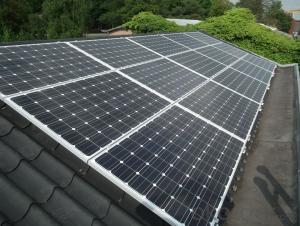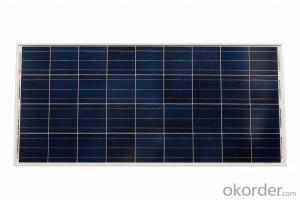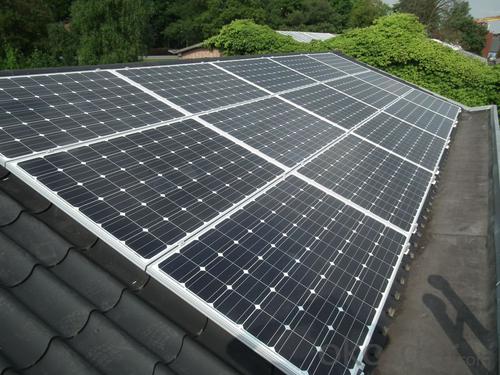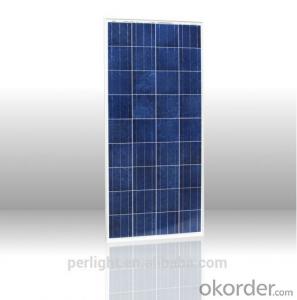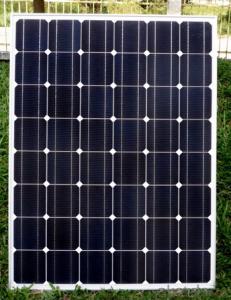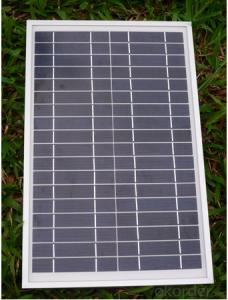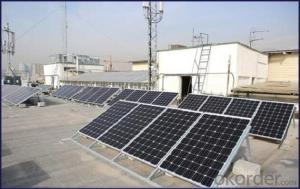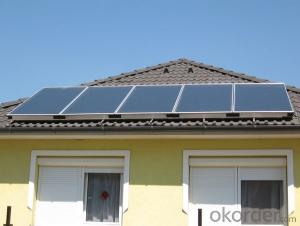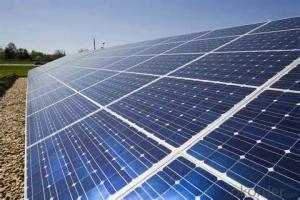10w Poly Solar Module with High Efficiency - Solar Panels Atlanta
- Loading Port:
- Tianjin
- Payment Terms:
- TT OR LC
- Min Order Qty:
- 1 watt
- Supply Capability:
- 100000 watt/month
OKorder Service Pledge
OKorder Financial Service
You Might Also Like
Specification
Product Description:
1.Structure of Solar Module Description
CNBM Solar's photovoltaic module is designed for designed for large electrical power requirement. It is the optimal choice for both on-grid and off-grid power systems. CNBM Solar offers high performance of power per square foot of solar array.
2.Main Features of the Solar Module
Solar Cell: High efficency crystalline solar cell. Even if under the weak light, the solar module can produce maximum power output.
Tempered glass: Anti-reflecting coating and high transmission rate glass increase the power output and mechanical strength of solar module.
EVA and TPT: Using high quality EVA and TPT to prevent destroying and water.
Strong aluminum frames to strengthen the load hold and to stand against high wind.
Junction box: Multi function junction box with water proof.
Long lifetime: ≥25 years; Less power decrease.
Good performance of preventing from atrocious weather such as wind and hails.
Resisting moisture and etching effectively, not effected by geology.
The certificate issued by international authority: UL, TUV, IEC, VDE, CE.
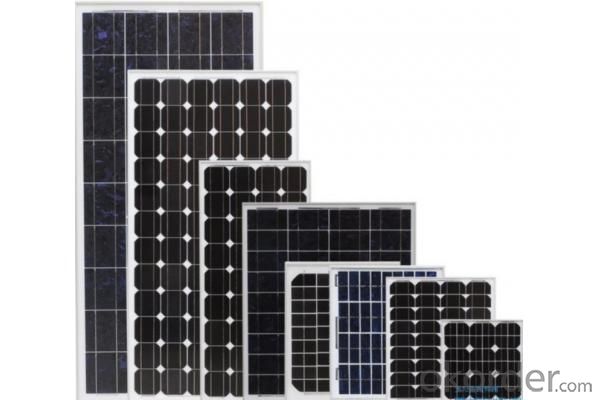
Solar panel working process
In addition to being the ultimate source of all life on earth, the sun is an infinitely renewable, completely pollution-free source of electricity. Instead of burning fossil fuels dug up from the ground in a big power plant – a very 19th century, industrial age approach, when you think about it – solar panels convert sunlight directly into electricity, with no harmful emissions.
The basic unit of a solar panel is a solar cell, which usually consists of one or two layers of silicon-based semiconductor wafers. When struck by the photons in sunlight, the solar cell generates an electrical charge due to the "photovoltaic effect" – which is a pretty good name, since it produces voltage from photons. The flow of these electrons moves in a steady electrical current from one side of the cell to the other.
Dozens of these PV cells are packaged together into solar modules, which in turn are packaged into solar panels that are mounted on a rooftop and arranged to maximize their hours of exposure to direct sunlight. Because the electricity generated by all those solar cells is direct current (DC), it is then sent to an inverter that transforms the power into the same alternating current (AC) used by the appliances in your home and the local utility electricity distribution grid. Increasingly, these inverters are getting "smart," providing data monitoring for solar installation performance and other grid integration services.
- Q: is this fact true? - its a limitation to solar panels during summer when it's in extremly hot countrie. I've heard it from my science teacher .. please give detail if you have any and any more benefits/limitations is welcomed .. Thank you :) !
- WHAT? This is far from the truth, IN Scottsdale Arizona a small apartment complex was fitted with solar {photo voltaic cells in the late 70s. Every summer they sold electricity back to the power company. It gets up to 5 fairly often here, and as hot as 23 in the shade. On a roof top it is over 50 in direct sunlight. The opposite is true. When it is cloudy they produce less electricity. They may loose some efficiency when it is very hot, but not enough to make them not work at all, or even enough to really harm the output to any really appreciable extent. A new plastic photovoltaic material that produces about 40-45% of a silicon based solar cell is a neat option as it works when it is very cloudy, you can drive nails through it, and it is flexible. I think these items are kept artificially expensive by big business, but this is just a biased opinion of mine, but as far as not working in extreme heat, NO these solar panels work just fine when it is hot. I am in Phoenix Arizona, and it does not get a whole lot hotter than here. If the cells from the 970s worked OK newer ones are better and will do just fine too. Solar hot water heaters are a slightly different matter as they will over heat the water and the water must be mixed with cooler water, or you can really get into trouble. Maybe this is what he meant. Still I doubt it is enough of an issue to cause the device to be less efficient than a gas water heater, or electric, etc. Maybe he is referring to having to mix cooler water into solar heated water in a solar hot water heater, or some other system, Photovoltaic cells do not have any problems rendering them useless from hot weather on this planet, and in fact, they are used in space and it gets much hotter there.
- Q: Can solar panels be used to power a factory?
- Yes, solar panels can be used to power a factory. By installing a sufficient number of solar panels on the factory's premises, the factory can generate enough renewable energy to meet its power requirements. This can help reduce reliance on traditional power sources and contribute to a more sustainable and eco-friendly operation.
- Q: Can solar panels be used in areas with high levels of dust storms?
- Yes, solar panels can still be used in areas with high levels of dust storms. However, it is important to ensure regular maintenance and cleaning of the panels to prevent dust accumulation, which can reduce their efficiency.
- Q: Can solar panels be installed on agricultural land?
- Yes, solar panels can be installed on agricultural land. In fact, it is a common practice to utilize agricultural land for solar energy projects. This dual use of land allows farmers to generate additional income from leasing their land for solar panel installations while continuing their agricultural activities. Moreover, solar panels can provide shade to crops, reduce water evaporation, and improve overall farm sustainability.
- Q: Can solar panels be installed in rural areas?
- Yes, solar panels can be installed in rural areas. In fact, rural areas are often ideal locations for solar panel installation due to the abundance of open space and sunlight. Solar energy can help provide electricity to remote communities, reducing their dependence on traditional power grids and improving energy access in those areas.
- Q: Can solar panels be installed on a university campus or educational facility?
- Yes, solar panels can certainly be installed on a university campus or educational facility. In fact, many educational institutions have already embraced solar energy as a sustainable and cost-effective solution. Installing solar panels can help universities reduce their carbon footprint, save money on energy costs, and serve as an educational tool for students to learn about renewable energy.
- Q: What is the impact of roof material on solar panels' performance?
- The impact of roof material on solar panels' performance is significant. The type and condition of the roof material can affect the efficiency and effectiveness of solar panels. Certain roof materials, such as metal or asphalt shingles, are more conducive to solar panel installation and can provide a stable and durable surface for the panels. These materials typically allow for better heat dissipation and can withstand the weight of the panels. On the other hand, roofs with clay tiles or slate may require special mounting systems and can be more challenging to install solar panels on. Additionally, a damaged or deteriorating roof can pose a risk to the overall performance and lifespan of the solar panels. Therefore, it is crucial to consider the roof material and its condition when planning for solar panel installation to ensure optimal performance and longevity.
- Q: How can I know the right type of solar panel to choose for my small village house in Africa?
- The power output of a solar panel uses a formula to determine kilowatts produced per hour per square meter per day. This calculation is important because, if you plan to install a solar power system for your home, you will want to know how many solar panels will be needed. To calculate solar power requirements correctly, you need to gather the data that is needed for the calculation. First you have to find the average amount of solar radiation available for your area. You can use a solar radiation chart. This can range from a 4 to a 7 depending on the area you live in. Write the number down on a piece of paper and indicate it with the letters RA. Next is determine the amount of electricity that you use daily. Add the kilowatt-hours used per month from your utility bill. Multiply this number by ,000 to get the watt hours in a month. Divide the total by 30 for the amount of electricity you use daily. Write this number down and indicate it with the letters DE. Determine the percentage of your home that you want to power with the solar power system. Write this number down and indicate it with the letter P. Determine the system inefficiency factor for the solar power system. You should be able to find this on the brochure for the system or from the manufacturer's web site. Write this number down and indicate it by the letter I. Determine the power or yield that is required for your home. Use the equation P = I x (DE x P) / RA to find the power requirements in kWh. Divide the number from Step 5 by the peak wattage for a single solar panel to determine the number of panels you will need for your home. Goodluck! :)
- Q: first of all, to be honest i have totally no idea on how a solar panel works.my task is to design something like a solar powered street lamp which store sun energy during day time and convert it into electrical energy then light energy so that the lamp can work during night time.any ideas on how to design the solar panel? which can store enough or more enegry in case there is no sunlight another day. and low cost as well :D
- image voltaic panels do no longer shop capability, they basically generate it. in case you opt to shop capability you like a battery economic enterprise of a few sort to get you for the time of the night and each time the sunlight isn't shining. in case you have somewhat extra in the fee selection you would be able to desire to look at a geothermal equipment to your place's heating and cooling needs. they are distinctly useful structures and you'd be able to supplement notwithstanding you like. notwithstanding you do, in spite of the indisputable fact that i'm hoping you have a sturdy construction envelope in place already. image voltaic panels are cool, yet once you have a leaky homestead, you're nevertheless no longer getting the final out of your panels. Do the extra mundane stuff first. Insulation, homestead windows, and climate-tight doorways.
- Q: I used to live from my car and i am soon returning to that way.I want a solar panel to a battery to a surge protector so that i can use a portable wifi box and my laptop at the same time. Also i would charge my phone occasionally.I would like the charge to be enough for several days in case of cloudy weather.I just do not want anything to short circuit or ruin my laptop etc.Is thete a way to get this?What do i need or what exactly should i look into?
- Actually they do make these... u have one but the voltage is no guaranteed as depends on the radiation from sunlight. I have a 8v 60Watt folding solar panel... works great and does charge laptop but not consistent. It works better when you also have an external battery with you as well. Battery will charge laptop Solar panel will charge battery Also most important... put laptop screen on super dim / power savior mode or else laptop will eat up energy. I have a desktop replacement hp laptop and able to keep it charged at 9volts just under 2amps... (38 watts)... on power save mode of course ALLPOWERS 8v 60Watt folding solar panel charger Also.... Poweradd Pilot 30000mAh multi-voltage (9v -20v) portable chargers. Remember solar panels are nothing without batteries... not just for storing at night but also storing all the energy you can get. If not you would only be powering the load
Send your message to us
10w Poly Solar Module with High Efficiency - Solar Panels Atlanta
- Loading Port:
- Tianjin
- Payment Terms:
- TT OR LC
- Min Order Qty:
- 1 watt
- Supply Capability:
- 100000 watt/month
OKorder Service Pledge
OKorder Financial Service
Similar products
Hot products
Hot Searches
Related keywords
